What Types of Bail Bonds Are Available in Texas?
 If you have been arrested, understanding the procedures that will be followed and the steps you will need to take to get out of jail can be overwhelming. Most of the time, a certain amount of bail will need to be paid before you can be released. The court will set an amount for bail that will be based on factors such as the severity of the offense, your previous criminal record, and the possibility that you may fail to return to court when required. It is important to understand the different types of bail bonds that will allow you to pay the required amount. A bail bond is a financial agreement between the court and the person posting bail on your behalf. The types of bail bonds that you may be able to use include:
If you have been arrested, understanding the procedures that will be followed and the steps you will need to take to get out of jail can be overwhelming. Most of the time, a certain amount of bail will need to be paid before you can be released. The court will set an amount for bail that will be based on factors such as the severity of the offense, your previous criminal record, and the possibility that you may fail to return to court when required. It is important to understand the different types of bail bonds that will allow you to pay the required amount. A bail bond is a financial agreement between the court and the person posting bail on your behalf. The types of bail bonds that you may be able to use include:
Cash Bonds
A cash bond requires that someone—usually a family member or close friend—pays the full amount of bail as set by the court. This money is held by the court until all of the defendant’s hearings or trials have been completed. Once this happens, the amount will be returned, although fines or fees imposed by the court may be deducted. It is important to note that if someone posts a cash bond on behalf of another person, they may not be able to get their money back if that person fails to appear in court as required.
Surety Bonds
Surety bonds involve three parties—the defendant, a bail bondsman, and the court. In this arrangement, a surety company agrees to pay any money owed if the defendant does not appear at their scheduled court dates. This is often the most affordable option, since the defendant will usually only be required to pay 10 percent of the total amount of bail.
Property Bonds
In cases where a defendant or their loved one does not have the cash on hand to pay bail, they may put up some of their property as collateral. This property may include a house, another piece of land, a vehicle, or other valuable possessions. In some cases, a person may be able to turn over the title to property, which will be held by a bail bondsman until other payment arrangements can be made. If the person fails to show up in court when required or does not pay the amount owed, the bail agent may then take possession of the property.
Personal Bonds
This type of bond does not require any money upfront; instead, it involves an agreement between a defendant and the court in which the defendant promises to appear in court when required. Judges may grant these bonds, which are also known as personal recognizance bonds, when they believe that a defendant is unlikely to flee or commit other crimes while out on bail pending trial.
Contact a Collin County Bail Bondsman
Navigating through different types of bail bonds can be complicated and confusing. If you or a loved one are facing criminal charges in Texas, it is important to understand your options so you can make informed decisions about how best to proceed with your case. At Doc's Bail Bonds, we can help you determine the best steps to take to get out of jail quickly, and we will work with you to determine the most affordable ways to pay the amount of bail set by a judge. We are available 24/7 to assist you, and with our knowledge of the jails and courts in the areas surrounding Dallas and Collin County, we can guide you through the bail bond process and make sure you can get released as soon as possible. To learn more about our services, contact our Plano bail agents at 214-747-4110.










